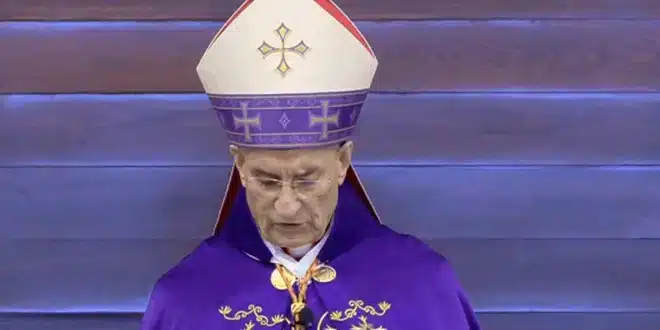Maronite Patriarch Beshara al-Rahi officiated the funeral of Lebanese Forces official Pascal Sleiman in Jbeil on Friday, asserting a stance of resilience and courage in his sermon. He emphasized the need to uncover the truth behind Sleiman’s assassination, highlighting the importance of understanding the motives and identifying the perpetrators behind this crime.
During the service, al-Rahi praised Sleiman’s widow for advocating against revenge and encouraging trust in Lebanon’s military and security forces, especially the army, which had successfully identified those responsible for the killing.
Al-Rahi also voiced concerns over the presence of displaced Syrians in Lebanon, describing it as a threat to the Lebanese people and stressing the urgency of addressing this issue collaboratively with both international and local entities to avoid further conflict and negative consequences.
The patriarch raised questions about the benefits of the ongoing chaos and the widespread availability of weapons, implying that these conditions serve the interests of those who seek to maintain control outside the conventional state mechanisms.
The backdrop to these remarks includes a rise in anti-Syrian sentiment following Sleiman’s murder, which the Lebanese army attributed to a Syrian gang involved in a carjacking incident. This crime has intensified calls from many Lebanese citizens for the return of Syrians to their homeland, amidst Lebanon’s severe economic crisis.
Caretaker Interior Minister Bassam Mawlawi responded by promising stricter regulations on Syrians in Lebanon, including the enforcement of laws regarding their residence and the conditions of their stay. He also mentioned the need for more regulated renting practices to Syrians.
Meanwhile, Caretaker Foreign Minister Abdallah Bou Habib referred to the Syrian population in Lebanon as problematic. Following the incident, there were public demonstrations and social unrest, including road blockages in Jbeil and social media accusations against Hezbollah, which denies involvement.
The situation has prompted warnings from human rights advocates like Ramzi Kaiss of Human Rights Watch, who stressed the necessity of a thorough and transparent investigation into Sleiman’s killing to counteract the longstanding impunity in Lebanon. He condemned the scapegoating of Syrian refugees, which he said could exacerbate violence against them.
Ultimately, the Lebanese judiciary reported that several Syrians confessed to the murder, stating their intent was to steal Sleiman’s car. Authorities in Damascus have cooperated by handing over some suspects and Sleiman’s body, which was found in a notorious lawless area near the border, indicating the complexities and sensitivities surrounding cross-border and internal Lebanese issues.


